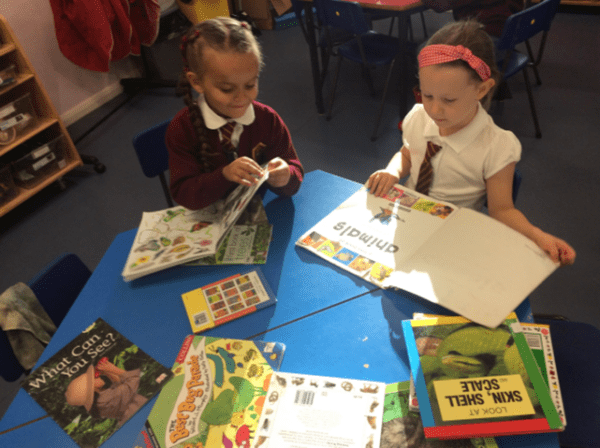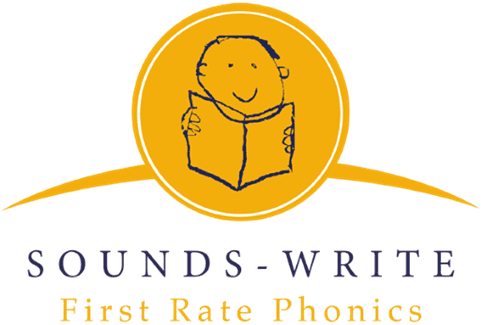Intent
At St John Fisher, we aim for children to have acquired the essential characteristics of good readers:
- Excellent phonic knowledge and skills.
- Fluency and accuracy in reading across a wide range of contexts throughout the curriculum.
- Knowledge of an extensive and rich vocabulary.
- An excellent comprehension of texts.
- The motivation to read for both study and for pleasure.
- Extensive knowledge through having read a rich and varied range of texts.
Implementation
Sounds Write is a DFE accredited Phonics scheme that we have been trained in teach all pupils how to read and spell.
The four key concepts children are taught are:
- letters are symbols that represent sounds
- sounds can be spelled using 1, 2, 3 or 4 letters
- the same sound can be spelled in different ways
- the same spelling can represent different sounds
The three key skills children will become proficient in are:
- blending
- segmenting
- phoneme manipulation
Early Reading – EYFS
Phonics
In EYFS, Concepts 1 and 2 are introduced and practised. Teachers plan 30 minutes daily sessions to introduce, then practise and apply the initial code. These sessions consist of:
Lesson 1- word building- introducing new code
Lesson 2 -symbol search -to ensure children recognise all symbols (letters) and can form them correctly
Lesson 3 – sound swap – developing phoneme manipulation skills
Lesson 4 – reading and writing words – practising and applying code knowledge
Lesson 5 – word building including sounds spelt with more than 1 letter
Books are read to the children on a daily basis, and we respond to what has been read through discussion, with appropriate questioning and modelling to deepen children’s understanding. In Lent term, as children become more proficient in code, as a class we will read books that are matched to their code knowledge. In these sessions, the teaching focus will be as follows:
Monday – Explicit vocabulary teaching
Tuesday – Fluency
Wednesday -Summarising
Thursday -Modelling and discussion of Comprehension
Friday – Modelling and discussion of Comprehension
Children will be heard read by an adult each week either as an individual or in pairs. These books will be matched to their code knowledge.
Right from week 1, children choose story books from the class library to share at home. Once code has been learnt, children will begin to take books that are matched to their code knowledge to practice with their parents at home. These books are changed weekly. Teachers will move children on through these matched books as their competence and confidence develops.
Early Reading in KS1
Phonics
Teachers plan 30 minutes daily sessions to introduce, then practise and apply the initial code. These sessions consist of:
Lesson 6 – One sound, different spellings- word building
Lesson 7 – One sound, different spellings- reading and writing
Lesson 8 – One sound, different spellings- sound review
Lesson 9 – Seek the sound – reading texts with focus code and noting different spellings
Lesson 10 – One spelling. Different sounds
We continue to have daily read aloud sessions, to broaden children’s experience of different genres and foster their love of reading.
Daily, as a class we will read books that are matched to their code knowledge. In these sessions, the teaching focus will be as follows:
Monday – Explicit vocabulary teaching
Tuesday – Fluency
Wednesday -Summarising
Thursday -Modelling and discussion of Comprehension
Friday – Moving towards more independent Comprehension
Children will be heard read by an adult each week either as an individual or in pairs. These books will be matched to their code knowledge.
Year 1- Children will take books that are matched to their code knowledge to practice with their parents at home. These books are changed weekly. Teachers will move children on through these matched books as their competence and confidence develops.
Year 2- Children will be assessed and be allocated a Book Band to select their book to practise their reading at home. These books will be changed as the children finish them. Teachers will move children onto a new Book Band, when assessment shows fluency and competence in comprehension.
Reading in KS2
We follow a bespoke curriculum to teach reading discretely. Reading lessons happen daily, following a structured approach to support every child in fluency and comprehension.
Monday – Explicit vocabulary teaching
Tuesday – Development of all aspects of fluency
Wednesday – Summarising and book talk
Thursday – Modelling and discussion of Comprehension
Friday – Independent Comprehension
This structure allows our children to learn the necessary important skills to become a reader in society and be able to learn across the curriculum, in a progressive way. Each day allows all children, regardless of their needs, the opportunity to access the text and gain confidence to read and comprehend a short text independently.
Teachers plan fiction, non-fiction and poetry texts throughout the year that support each cohort’s needs. They are a range of classic and modern, vocabulary rich texts, with diverse topics that support our community and cultural capital.
Children read to an adult every week so that adults can support and challenge each child with their fluency and comprehension regularly.
Developing a love of read is vital for all children. Class teachers dedicate time every day to read a novel, while children can sit back and enjoy listening. They also get time to enjoy reading a book of their choice.


Video about phonics at St John Fisher


